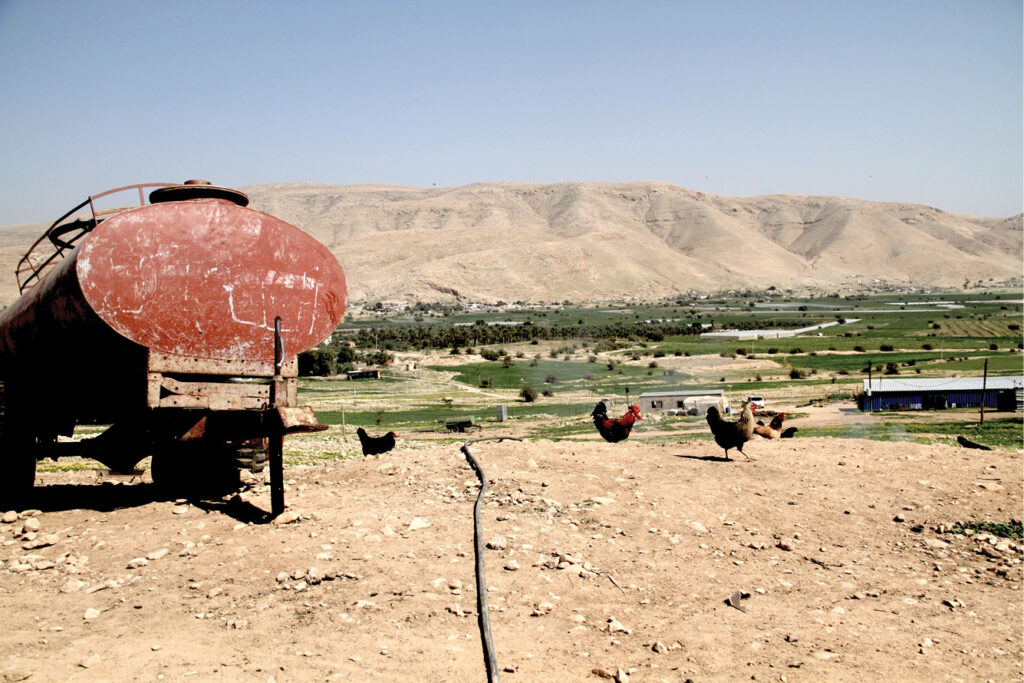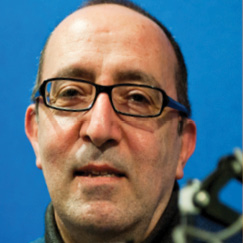There is music, and there is cacophony. To distinguish between them is the purpose of life. Or to paraphrase George Eliot in her novel Middlemarch, this is the roar which lies on the other side of silence.
Over the past few months, ever since the unwrapping of the so-called Deal of the Century that was fatuously marketed as Peace to Prosperity and unveiled jointly by President Donald Trump and Prime Minister Benyamin Netanyahu at the White House on January 28, 2020, this distinction between music and cacophony has constantly intruded into my thoughts.
Why? The answer lies to a large extent in Netanyahu’s makeup. It is the way that his political mind is wired rather than any abstract political thinking that controls his instincts, aided and abetted as they are, of course, by an American president who has his own psychological chinks too. In a nutshell, and put bluntly, Netanyahu is for Netanyahu, and other factors are often subsidiary to this fact. But again, why?

Beginning with the uprisings that started across parts of the Middle East and North Africa regions in 2010, the Palestinian issue has gradually been sidelined in the imagination of Arab leaders and also by large numbers of the Arab masses. Arab leaders will have been quite happy to ignore a conflict that has haunted, taunted, or embarrassed them for decades, and they would, in all likelihood, be happy to see it forgotten completely so that they can have their own public relations with Israel irrespective of the motivation behind their decisions. I am not divulging a secret here, as almost everyone, from falafel sellers and taxi drivers to analysts and lawyers, knows full well this reality.
As for the masses, both Arab and Muslim, I believe that they still have their hearts very much invested in the Palestinian dream. They are traumatized, however, by the consequences of the “Arab Spring” and the relentless counterattacks of the Arab political and security forces. They have scant reserve energies left to lobby for this conflict. The occupied Palestinian lands drop quite sharply in their league of priorities when they have to grapple with the daily existential challenges of lives and livelihoods, safety issues, and the welfare of their families. Choices have to be made in life.
To compound further the illegality of an occupation under international law, PM Benyamin Netanyahu is now promising and threatening in equal measure to annex an additional 30 percent of Palestinian lands. He is doing this in order to maintain his own hold on power. But there always comes a time in history when people discern the difference between music and cacophony.
Consequently, the Israeli-Palestinian conflict was shelved, much to the benefit of some Arab leaders, let alone diminished in the imagination of many Arabs or Muslims worldwide. Add to this that the US administration had proved that it is not an honest broker but a PR agent for Israel (look at US Ambassador David Friedman and his political antics!) and that the European Union was hopelessly divided in terms of its foreign policy approach to this conflict, and things looked decidedly grim. Many Palestinian friends or colleagues admit to me – more in private than publicly – that neither the Palestinian leadership in Ramallah nor in Gaza has delivered the goods, and that Palestine as a potential for self-determination has been mothballed for the next decade.
Sad indeed, and also upsetting, disheartening, disappointing, and painful for me. As someone who has toiled hard to fulfill the objective of a sovereign, contiguous, and inclusive Palestinian state next to Israel, I too have witnessed this hope slithering away. Whether it is because Palestinians have miscalculated the outcome of the Oslo process, or else the treachery of erstwhile allies and the craftiness of Israeli politics, I and countless others of my generation are being robbed of the single dream of witnessing a Palestinian state during our own lifetimes.
In the midst of this hiatus in Palestinian goals, where hopes were splintered, one would have thought that Netanyahu would be congratulating himself fiercely on his achievements. After all, he had seemingly succeeded in emasculating the drive for Palestinian statehood and had reverted to his favorite ploy of managing an occupation. In the words of Afif Safieh, a Palestinian Christian from Jerusalem who has been a member of the Palestine Liberation Organization and served as ambassador to the Holy See as well as to the United Kingdom, Russia, and the United States, Israel has been keeping Palestinian geography and ridding itself of Palestinian demography. Quite an achievement, wouldn’t you say?

And yet, despite all the odds that favor his inaction, Netanyahu’s renewed expansionism helped put the Palestinian question smack bang on the front burner. And in so doing, he not only thwarted the plans of some Arab leaders who were happy with the status quo, he also placed the European Union in an unenviable corner and ended up stoking once more an opposition to his policies of occupation, annexation, and surrender.
So I ask myself once more, why now?
Netanyahu belongs to the breed of political leaders around the world whose megalomaniacal tactics mean that he is first and foremost interested in taking care of Number One. Faced with the prospect of losing the prime ministerial slot, and therefore becoming vulnerable in the face of the three pending indictments (Cases 1000, 2000, and 4000) in the High Court in Jerusalem (located in occupied Arab East Jerusalem, incidentally) that could lead to a custodial sentence, as happened with his predecessor Ehud Olmert, he wanted to rally the right-wing population in Israel. With its support, he is less vulnerable, and the best way to ensure that support is to promise further annexations of Palestinian lands – be they in the Jordan Valley bordering Jordan, or the cluster of settlements around Jerusalem (known as E1), or in the West Bank. What better manna from heaven for rabid Israeli settlers who wish to row back history to the yellowing biblical pages of the Old Testament in order to revive the divine promise made to Israelites, create anew a large Eretz Yisrael (Land of Israel), and perpetuate an insidious occupation upon millions of indigenous Palestinians?
So will this happen soon? Will the Jordan Valley that is a gateway for Palestinians be grabbed by Israel – in a move that is illegal under international law – to secure Netanyahu’s putative legal immunity and in the process carve out for him a Zionist legacy that outpaces that of David Ben Gurion?
I do not think so. But in order to ensure that this does not happen, it is critical that all gird their loins in order to stop this opportunistic scheme that pushes all the populist buttons. The two Palestinian authorities, one in Ramallah and the other in Gaza, must discover a common language to resist this annexationist – expansionist – trend, no matter how much they love or loathe each other. It is also critical that the Arab countries, alongside the Arab League and the Gulf Cooperation Council, get off the diplomatic fence and take some concrete measures to support the Palestinian (and Jordanian) position. Moreover, it is vital that the real movers and shakers in the European Union (and I still include the United Kingdom in this bracket, at least until December 31, 2020) enounce robust measures to resist a policy that could easily segue into an apartheid system, imprisoning Palestinians in self-isolated enclaves. Let us be clear, dear reader, Europe is not powerless. Rather, Europe shies away from using its soft power. And finally, there is a faint hope that Jared Kushner, President Donald Trump’s son-in-law, as well as the cohorts of US Evangelical Christian groups that are a backbone of the Trump policies, will lose their influence in November 2020.
By nature, as some colleagues would wryly aver, I am not given to unbridled optimism. I am not a political Pollyanna, nor am I a grousing pessimist. In the words of the wonderful Palestinian communist novelist Emile Habibi, I am merely a pessoptimist – not light-years away from a pragmatist. So when This Week in Palestine kindly invites me to contribute a piece on annexation, I would argue that Palestinians appear to be losing this latest game of chess with Israel but – and this is key – they have not been checkmated yet and therefore have not lost the game.
Palestinians have memory, and they also have resilience. In the words of the Palestinian poet Tawfiq Ziyad, “In Lidda, in Ramla, in the Galilee, we shall remain like a wall upon your chest, and in your throat like a shard of glass, a cactus thorn, and in your eyes a sandstorm.”

In my opinion, what is required of Palestinians today is a redefinition of purpose and a restatement of the narrative that emboldens their fight – whether for independence or for a binational state. And they should, therefore, also append to the purpose of their narrative the wisdom that helps achieve their objectives. It is not easy, and Palestinians are weary from decades of resistance, from the wars of attrition conducted by Israel against them, from the unreliability of friends and the antagonism of foes, as well as from their own internecine and lamentable dissensions. Let me be clear: the annexation or otherwise of the Jordan Valley is not the cause of the stasis that infects Palestinian political aspirations today. Rather, it is the regrettable symptom.
I started off by referring to George Eliot. I suggested that in life, there is music and cacophony, and that distinguishing between them is one purpose of life. How very true today in the context of the skewed biases that impact Palestinian hopes for human dignity, justice, and freedom. However, as I mull over a cruel occupation that has lasted for long decades, and as I envisage the threats of annexation, I recall a warning by the wonderful Palestinian national poet Mahmoud Darwish: “Nothing is harder on the soul than the smell of dreams while they are evaporating.”
Quite true, which is why Palestinians in Jerusalem, in the West Bank, in Israel, and most critically in the diaspora, should come together to assume the responsibility of keeping Palestine alive in the political corridors of the world and prevent the evaporation of their dreams. After all, no matter whether it is a masterly stroke or an unmistakable diversion, even Netanyahu, with all his fey political prestidigitation, cannot continue to fool all the people all the time.


